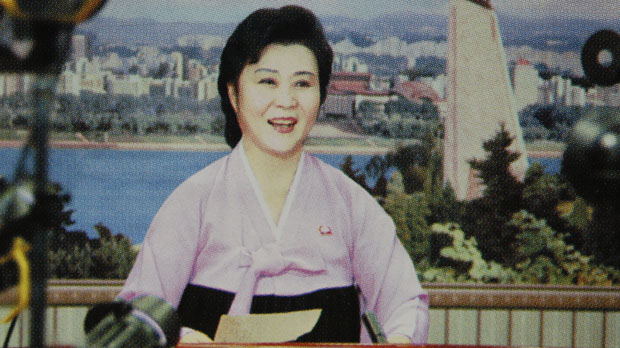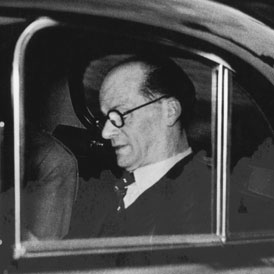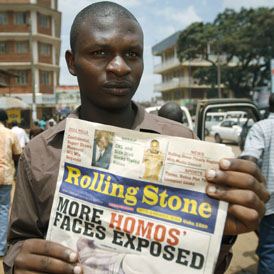Forget phone hacking: the world’s worst media abuses
For anyone who think the phone-hacking scandal represents a new low for the British media, here’s a reminder that other people have had it much, much worse.

Bias, sensationalism, loose morals and dubious ties with the government. All old news as far as the world of journalism is concerned.
As the phone hacking scandal continues to dominate the headlines in Britain, Channel 4 News counts down the top media scandals from around the world, some of them committed by hacks, some of them reminders that it’s not always the politicians who need to be scared of the reporters.
North Korea’s happiness index
Flooding, food shortages and the daily grind of life under one of the world’s most repressive dictatorships haven’t dented the spirits of the the happy-go-lucky citizens of North Korea.
That’s according to the Hermit Kingdom’s state news service Chosun Central Television, which announced the surprising results of a new global happiness index earlier this year.
Researchers found that North Korea is the happiest place on earth, second only in quality of life to China, the communist country’s last remaining ally.
Cuba, Iran and Venezuela make up the rest of the top five, while the United States comes in last at number 203.
Please send me to the US so I can suffer, too.
The story was greeted with widespread sarcasm even in China, where online commentators posted messages like: “Please send me to the US so I can suffer, too.”
The strident delivery of North Korea’s newsreader Ri Chun-hee has made her a cult favourite on the internet, and foreign analysts are forced to pore over the broadcasts for clues on what policies the country’s otherwise uncommunicative leaders are pursuing.
Last year, Reporters Without Borders ranked freedom of the press in the country as 177th out of 178. Only Eritrea, a country that shut down all independent media in 2001 and carted journalists off to prison camps, was considered worse.
Fleet Street’s “Murder Gang”
The postwar equivalent of the phone hacking scandal also involved the now-defunct News of the World.

Its star crime reporter Norman Rae wasn’t above paying for stories, and his sources went beyond contacts in the police.
Rae went so far as to set up a meeting with John Christie, who had murdered at least eight women in his flat at 10 Rillington Place in London’s Notting Hill, while the killer was the subject of a police manhunt.
Christie said he wanted to give the News of the World an exclusive interview before handing himself in. In the end, the notorious serial killer fled the scene of the rendezvous with Rae before any money could change hands when he spotted two policemen nearby.
Rae and his great rival, Harry Procter of the Daily Mail and Sunday Pictorial, reportedly picked up the legal bill for Christie as well as serial killers Neville Heath and John George Haigh in return for exclusive interviews.
Zimbabwe’s secret media moguls
Concerns have been raised in Parliament over the growth of Rupert Murdoch’s empire and the question of whether his News Corp executives are “fit and proper” people to take charge of the broadcaster BSkyB.
Spare a thought for the staff of three successful privately-owned newspapers in Zimbabwe, who in 2009 were reported to have been the subject of an extremely hostile takeover bid from the kind of people who would certainly give Ofcom pause for thought.
Robert Mugabe’s secret police, the Central Intelligence Organisation, allegedly used state funds diverted through shell companies to secretly buy majority shares in the country’s Daily Mirror, Sunday Mirror and Financial Gazette.
The intelligence agency – which has been accused of carrying out executions, torture, beatings and abductions by human rights groups – was also reported to be behind the closure of four privately-owned mass-circulation newspapers months before the takeover.
The infiltration of Zimbabwe’s newspaper industry by spies marked the end of effective widespread media opposition to Mr Mugabe, according to the BBC World Service Trust-backed African Media Development Inititiative.
Uganda’s tabloids
The colourful language of the East African country’s red tops defies imitation.

“Babes” and “bonkfests” abound, all of which would be funny if it wasn’t for the obsessive hatred of homosexuality also reflected in the headlines.
At one point, the newspaper Rolling Stone (no relation to the US magazine), published the photographs of dozens of gay men along with apparent calls for them to be executed.
We want the government to hang people who promote homosexuality, not for the public to attack them. We said they should be hanged, not stoned or attacked. Giles Muhame
The paper’s editor, Giles Muhame, clarified his position after one of the men he “exposed” – a well-known gay rights activist called David Kato – was found beaten to death.
Mr Muhame said: “We want the government to hang people who promote homosexuality, not for the public to attack them. We said they should be hanged, not stoned or attacked.”
Reporters who would kill for a good story
The pressure on reporters to come up with stories has been known to lead to all kinds of unscrupulous behaviour.
A dishonourable mention must go to Jayson Blair of the New York Times, who made up or plagiarised a string of stories in the early 2000s, regularly claiming to be covering stories in various cities when he was in fact hundreds of miles away.
Some journalists have actually committed serious crimes so they have a story to cover.
In 2009, Brazilian TV presenter Wallace Souza was accused of hiring hitmen to kill five people to boost the ratings of his hit show.
Police arrested him after realising that he always seemed to make it to crime scenes before they did. Souza protested his innocence and died of a heart attack in prison before his case came to trial.
And in 2008, Macedonian newspaper reporter Vlado Tanevski decided to take matters into his own hands when the Balkan country failed to throw up enough crime stories.
The 56-year-old was alleged to have raped, tortured and murdered four elderly women in the town of Kicevo.
As in the case of Souza, it was the quality of the exclusive reports he filed that aroused suspicion. The journalist was arrested after his stories were found to include details of the killings that the police had not released to the press.
Tanevski, who was said to have targeted victims who reminded him of his mother, committed suicide in his prison cell.
-
Latest news
-
Laughing Boy: New play tells the tragic tale of Connor Sparrowhawk5m

-
Sewage warning system allows some of worst test results to be left off rating system, analysis shows3m

-
Post Office inquiry: Former CEO didn’t like word “bugs” to refer to faulty IT system4m

-
Israeli soldier speaks out on war in Gaza12m

-
PM’s defence spending boost should be ‘celebrated’, says former Armed Forces Minister4m

-




